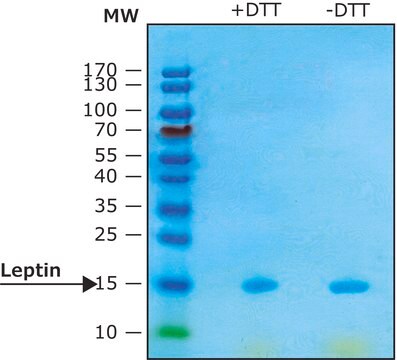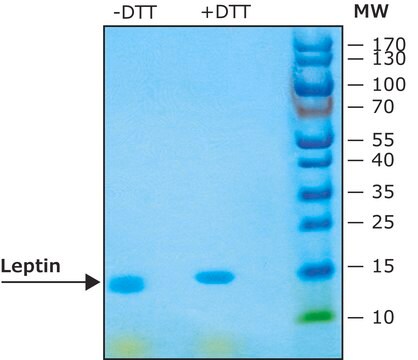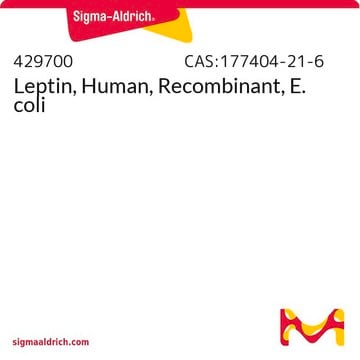L5037
Leptin from rat
≥97% (SDS-PAGE), recombinant, expressed in E. coli, lyophilized powder
Synonym(s):
OB
Sign Into View Organizational & Contract Pricing
All Photos(2)
About This Item
Recommended Products
recombinant
expressed in E. coli
Quality Level
sterility
non-sterile
Assay
≥97% (SDS-PAGE)
form
lyophilized powder
potency
≤0.8 ng/mL ED50
mol wt
16 kDa
impurities
≤1.0 EU/μg endotoxin
UniProt accession no.
shipped in
ambient
storage temp.
−20°C
Gene Information
rat ... Lep(25608)
Application
Leptin from rat has been used:
- to check the effect of intranasal nerve growth factor (NGF) on NGF activity in the spinal cord of Sprague-Dawley rats
- for validation of labelling for leptin-bearing cells of Sprague-Dawley rats
- to study the effect of leptin on STAT3 (signal transducer and activator of transcription 3) phosphorylation in neural population of Sprague-Dawley rats
- to study leptin response towards chemoreflex in nucleus of the solitary tract
- in rats, to check the effect of association between leptin and neuronal nitric oxide pathway on penicillin-induced epileptiform activity
Biochem/physiol Actions
In rodents with uncontrolled diabetes mellitus, leptin is crucial for normalizing hyperglycemia. In the digestive tract, it also participates in the absorption of dietary molecules via controlling transporters activity.
Leptin is a hormone produced primarily in adipocytes, although leptin mRNA has also been identified in placenta and fetal tissues, gastric tissue and liver. Its primary site of action appears to be on neurons in the hypothalamus that are involved in regulating energy balance, appetite, and body weight. Leptin increases the production of nitric oxide in endothelial cells and stimulates angiogenesis in vitro and in vivo.
Human and mouse leptin share ~84% sequence identity.
Human and mouse leptin share ~84% sequence identity.
Physical form
Lyophilized from a 0.2 μm filtered solution with 4.5 mM NaHCO3.
Analysis Note
The biological activity is measured by its ability to induce proliferation of leptin-dependent human OB-R transfected murine BAF3 cells.
Storage Class Code
11 - Combustible Solids
WGK
WGK 3
Flash Point(F)
Not applicable
Flash Point(C)
Not applicable
Personal Protective Equipment
dust mask type N95 (US), Eyeshields, Gloves
Certificates of Analysis (COA)
Search for Certificates of Analysis (COA) by entering the products Lot/Batch Number. Lot and Batch Numbers can be found on a product’s label following the words ‘Lot’ or ‘Batch’.
Already Own This Product?
Find documentation for the products that you have recently purchased in the Document Library.
Gregory J Morton et al.
The Journal of clinical investigation, 125(12), 4587-4591 (2015-11-04)
Leptin administration restores euglycemia in rodents with severe insulin-deficient diabetes, and recent studies to explain this phenomenon have focused on the ability of leptin to normalize excessive hypothalamic-pituitary-adrenal (HPA) axis activity. Here, we employed a streptozotocin-induced rat model (STZ-DM) of
Iris A McDuffie et al.
The journal of histochemistry and cytochemistry : official journal of the Histochemistry Society, 52(2), 263-273 (2004-01-20)
Leptin, the ob protein, regulates food intake and satiety and can be found in the anterior pituitary. Leptin antigens and mRNA were studied in the anterior pituitary (AP) cells of male and female rats to learn more about its regulation.
John Ciriello et al.
American journal of physiology. Regulatory, integrative and comparative physiology, 303(7), R727-R736 (2012-08-24)
Circulating levels of leptin are elevated in individuals suffering from chronic intermittent hypoxia (CIH). Systemic and central administration of leptin elicits increases in sympathetic nervous activity (SNA), arterial pressure (AP), and heart rate (HR), and it attenuates the baroreceptor reflex
Carmen Fanjul et al.
Journal of physiology and biochemistry, 71(2), 311-317 (2015-05-04)
Leptin is secreted into the digestive tract and contributes to the absorption of dietary molecules by regulating transporters activity. Here, we studied the effect of luminal leptin on the intestinal transport of L-glutamate, an important component of human diet. We
P M Smith et al.
American journal of physiology. Regulatory, integrative and comparative physiology, 296(3), R512-R520 (2008-11-21)
Adipose tissue plays a critical role in energy homeostasis, secreting adipokines that control feeding, thermogenesis, and neuroendocrine function. Leptin is the prototypic adipokine that acts centrally to signal long-term energy balance. While hypothalamic and brain stem nuclei are well-established sites
Articles
Lipid Induced Insulin Resistance
Our team of scientists has experience in all areas of research including Life Science, Material Science, Chemical Synthesis, Chromatography, Analytical and many others.
Contact Technical Service







